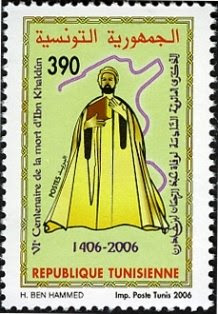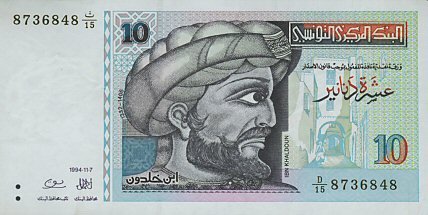Ibn Khaldūn, born on May 27, 1332, was an Tunisian philosopher and historian often regarded as one of the founding fathers of modern historiography, sociology, and economics.
He is best known for his book The Muqadimmah. The book contains valuable findings on the social sciences, economics, historiography, political theory, and even the natural sciences of biology and chemistry. It was a major influence on 17th century Ottoman historians and 19th century European scholars.
Particularly striking is his passage on man’s ability to think, as he breaks it down into three kinds of intellect, discerning intellect, experimental intellect, and speculative intellect.
As a Muslim, he felt that God distinguished man from all the other animals by giving him an ability to think which created the beginning of human perfection and the end of man’s noble superiority over existing things.

Birth home of Khaldun in Tunis.
This comes about as follows: Perception - that is, consciousness, on the part of the person who perceives, in his essence of things that are outside his essence - is something peculiar to living beings to the exclusion of all other beings and existent things.
He felt this ability of man to perceive of things outside his essence came from the “special powers” of his brain:
With the help of these powers, man takes the pictures of the sensibilia, applies his mind to them, and thus abstracts from them other pictures. The ability to think is the occupation with pictures that are beyond sense perception, and the application of the mind to them for analysis and synthesis.
The ability to think comes from the three degrees of intellect:

Ibn Khaldun depicted on a Tunisian stamp.
The first degree is man’s intellectual understanding of the things that exist in the outside world in a natural or arbitrary order, so that he may try to arrange them with the help of his own power. This kind of thinking mostly consists of perceptions. It is the discerning intellect, a with the help of which man obtains the things that are useful for him and his livelihood, and repels the things that are harmful to him.
On experimental intellect:
The second degree is the ability to think which provides man with the ideas and the behavior needed in dealing with his fellow men and in leading them. It mostly conveys apperceptions, which are obtained one by one through experience, until they have become really useful. This is called the experimental intellect.
Portrait of Ibn Khaldun.
The third degree is what he called the speculative intellect:
The third degree is the ability to think which provides the knowledge, or hypothetical knowledge, of an object beyond sense perception without any practical activity (going with it). This is the speculative intellect. It consists of both perceptions and apperceptions.
The interaction of apperception and perception that for Khaldun defines human reality:
They are arranged according to a special order, following special conditions, and thus provide some other knowledge of the same kind, that is, either perceptive or apperceptive. Then, they are again combined with something else, and again provide some other knowledge. The end of the process is to be provided with the perception of existence as it is, with its various genera, differences, reasons, and causes. By thinking about these things, (man) achieves perfection in his reality and becomes pure intellect and perceptive soul. This is the meaning of human reality.


COMMENTS ARE OFF THIS POST